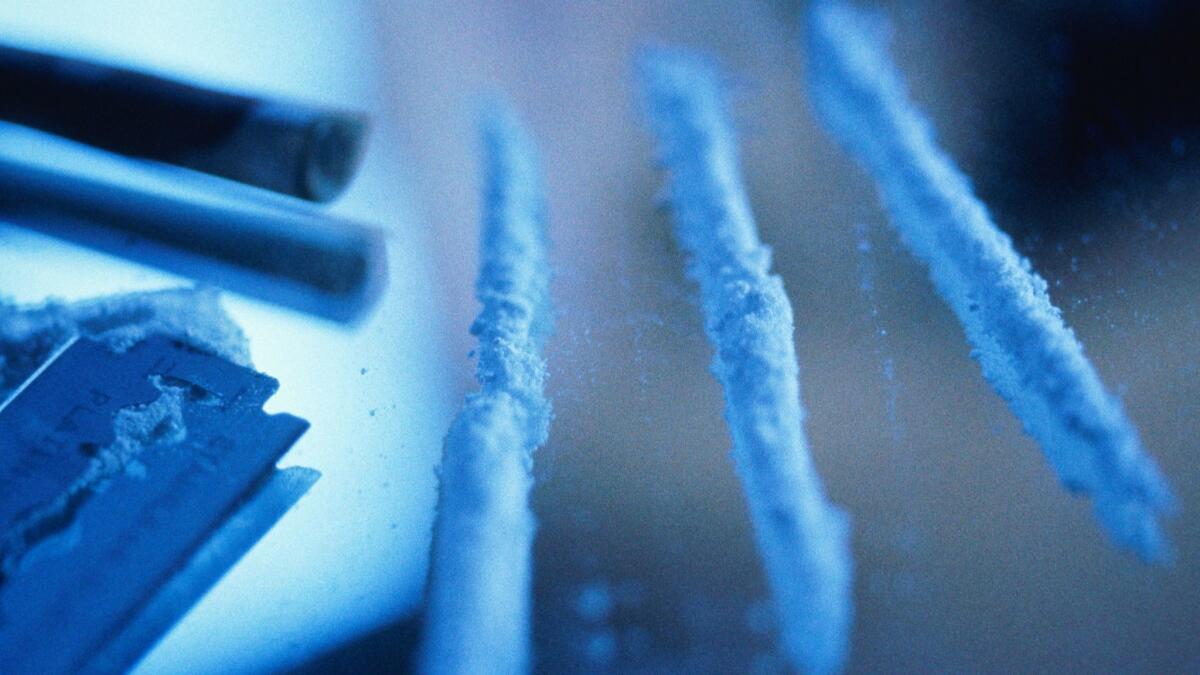Op-Ed: Los Angeles, stop doing cocaine

- Share via
In Los Angeles, conscious consumerism is in vogue. We vote with our dollars, leveraging purchasing power to effect change in a world that often defends the profitable status quo.
Evidence of our ethical consumption is everywhere — in local markets stocked with fair-trade coffee and vegan items; on the radio in advertisements for conflict-free diamonds; on the road, where energy-efficient hybrids have become the norm rather than the exception.
Yet the landscape of conscious consumption is marred by a conspicuous contradiction: If we truly care about our world, why do so many of us still view recreational cocaine use as permissible, harmless or even romantic?
The cokehead has become a ubiquitous fixture of our city’s imagination. Today you can tune in to a television dramatization of the crack epidemic featuring an archetypal Angeleno cocaine bon vivant who owes as much to Paul Thomas Anderson’s Dirk Diggler and Quentin Tarantino’s Mia Wallace as to the legion of everyday users who can be found hunched over countertops and tables in the back of clubs and bars around the city. The phenomenon is so pervasive you need look no further than Yelp, where the search terms “cocaine bar” yield an impressive list of watering holes marked by flagrant inhalation.
Angelenos look down on people who wear fur or wear blood diamonds or eat factory-farmed meat. In this city, of all places, we shouldn’t glorify cocaine.
A culture of privilege has fostered an image of cocaine as an elegant accessory to fame, fortune and status. We associate it with extravagant, celebrity-filled parties. Cocaine gives an ephemeral high. It temporarily alleviates depression in favor of euphoria, affording the user a brief reprieve from real life.
But there’s no denying the ugly reality of the cocaine trade. Its blood cost is not a hypothetical; it is blatant — in the drug violence that has marred Mexico, Central America, the Caribbean and South America. During the height of the cartel wars from 2007 to 2014, more than 164,000 people were murdered in Mexico. And of those deaths, roughly half — according to some estimates — were related to the drug trade. Ten of the 12 countries with the worst homicide rates are associated with cocaine production and trafficking.
Violence touches every link on the supply chain from South America to your nostrils, at which point, let’s not forget, cocaine remains lethal. The drug can trigger a heart attack, stroke or erectile dysfunction. In the United States, cocaine overdose deaths jumped 52.4% from 6,784 to 10,375 between 2015 and 2016. This is what you’re paying for when you buy cocaine.
Historically, anti-cocaine propaganda has been used to malign communities of color. Long before the crack epidemic gutted our cities’ poorest African American neighborhoods, the drug was made illegal due in no small part to urban legends of “cocaine-crazed negroes” striking out at cops and seducing white women.
Today, cocaine smuggling provides a neat little package for immigration opponents whose threadbare arguments against Latinos depend on magnifying the deeds of a few “bad hombres.”
Enter the Fray: First takes on the news of the minute from L.A. Times Opinion »
But the fact that reactionaries have used cocaine to attack communities of color doesn’t somehow make cocaine OK. If paranoia about drugs fuels red-state xenophobia and, in turn, ICE raids, that doesn’t change the reality that, south of the border, drug trafficking destabilizes whole states and forces people to flee en masse, then seek shelter here.
There’s a reason why Pablo Escobar’s colleague in the coke trade, Carlos Lehder, viewed cocaine as a bomb that would eventually destroy America from the inside out.
I don’t mean to suggest that I support the war on drugs. It has been an outright failure. The criminalization of addiction and the subsequent toll levied on impoverished communities has done irreparable harm to our nation and city.
I am not interested in lecturing those ensnared by cocaine addiction. The drug’s well-documented habit-forming properties put it in the same league as opiates, methamphetamine and alcohol.
I am interested in making casual, social use of the drug seem as abhorrent — as anti-social — as it really is. Angelenos look down on people who wear fur or wear blood diamonds or eat factory-farmed meat. In this city, of all places, we shouldn’t glorify cocaine and we shouldn’t finance its production.
Dan Johnson is a writer living in Los Angeles.
Follow the Opinion section on Twitter @latimesopinion or Facebook
More to Read
A cure for the common opinion
Get thought-provoking perspectives with our weekly newsletter.
You may occasionally receive promotional content from the Los Angeles Times.









